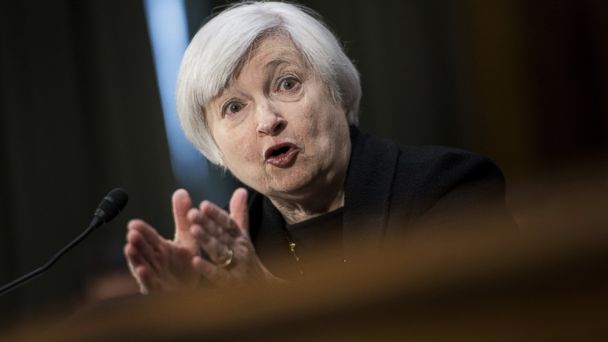Yellen: Unemployment 'Still Too High'

Brendan Smialowski/AFP/Getty Images
WASHINGTON-Federal Reserve chair nominee Janet Yellen faced the Senate Banking Committee Thursday for her confirmation hearing and emphasized a message consistent with current policy in the central bank, as well as a commitment to transparency.
Yellen, 67, who is currently the Federal Reserve vice chairwoman and would be the first woman to head up the Fed, defended the central bank's stimulus efforts under mostly mild and polite questioning from the group of senators.
If Yellen is confirmed, the former president of the Federal Reserve Bank of San Francisco would succeed Ben Bernanke when his term as chairman ends at the end of January.
5 Surprising Things About Janet Yellen
Throughout the hearing she also signaled a desire to help bring down unemployment and strengthen the economy, saying in her testimony that the Federal Reserve's "decisions affect the wellbeing of every American, and the strength and prosperity of our nation."
"That prosperity depends most, of course, on the productiveness and enterprise of the American people. But the Federal Reserve plays a role, too, promoting conditions that foster maximum employment, low and stable inflation, and a safe and sound financial system," Yellen told the Senate Banking Committee.
She said unemployment, while down, "is still too high, reflecting a labor market and economy performing far short of their potential."
Yellen also consistently promised to be transparent if confirmed, noting she believes the Fed is already "one of the most transparent central banks in the world."
"In the past two decades, and especially under Chairman Bernanke, the Federal Reserve has provided more and clearer information about its goals," Yellen said. "Like the chairman, I strongly believe that monetary policy is most effective when the public understands what the Fed is trying to do and how it plans to do it."
She was asked by several senators how her work as Fed chair will lead to reduced unemployment and help strengthen the middle class. She said she will be "strongly committed" to help promote a "robust economic recovery" and called the fact that approximately 36 percent of all those unemployed have been so for more than six months a "virtually unprecedented situation."
"And we note that those long spells of unemployment are particularly painful for households and pose great hardship and costs on those without work, on the marriages of those who suffer these long unemployment spells, on their families," said Yellen.
When asked by Sen. Sherrod Brown, D-Ohio, how the "Fed's monetary policy directly benefits families on Main Street," she again stressed that the "objective of our policy is to broadly benefit all Americans, especially those who are seeing harm come to them and their families from high unemployment in a recovery that's taken a long time and been, frankly, disappointing."
Janet Yellen, Nominee to Lead the Fed, at a Glance
Yellen also stressed that the economic recovery still needs support from the central back and did not say when the Federal Reserve, under her leadership, may ease back on stimulus.
"It's important not to remove support, especially when the recovery is fragile and the tools available to monetary policy should the economy falter are limited given that interest rates are at zero," Yellen said.
Yellen deflected several questions about when the central bank would start reducing bond purchases, a policy known as "quantitative easing." Critics of the policy say it raises the risk of inflation and some senators, including Sen. Michael Crap, R-Idaho, asked Yellen when, if confirmed, she would start withdrawing support for the policy.
She said there is "no set time," but acknowledged the worry, saying "the longer this program continues, the more we will have to worry about those risks."
Elizabeth Warren, D-MA, who has been a critic of Wall Street, also brought up the topic of quantitative easing, but said "the truth is if the regulators had done their jobs and reined in the banks, we wouldn't need to be talking about quantitative easing because we could have avoided the 2008 crisis altogether."
She said she is worried that the "Fed's regulatory and supervisory responsibilities to keep the big banks in check… just aren't a top priority for the board of governors."
"I think we need to make reining in the banks a top priority for the board," Warren said.
Yellen answered that she "absolutely believe[s] that our supervisory responsibilities are critical and they're just as important as monetary policy and we need to take them just as seriously and devote just as much time and attention to them as we do to monetary policy."
Despite a mild-mannered grilling and the expectation she will be confirmed, several Republican senators have threatened to place a hold on Yellen's confirmation. Sen. Rand Paul, R-Ky., wants to use Yellen's nomination to force a vote on his bill to audit the Federal Reserve, while Sen. Lindsey Graham, R-S.C., has warned that he'll place holds on all of President Obama's confirmations until the Senate is provided access to survivors of the attacks on the U.S. consulate in Benghazi.
Yellen met with various senators this week prior to her confirmation hearing today.
ABC News' Arlette Saenz contributed to this report.